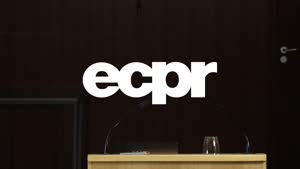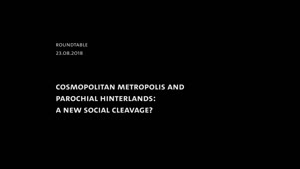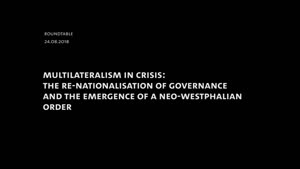Cosmopolitan Metropolis and Parochial Hinterlands: A New Social Cleavage? - Prof. Dr. Radoslaw Markowski, Prof. Dr. Reinhard Heinisch, Selim Erdem Aytaç, Prof. Dr. Sigrid Roßteutscher, Prof. Dr. Sarah L. de Lange - University of Hamburg
- Lecture2Go
- Catalog
- F.2 - Wirtschafts- und Sozialwissenschaften
- Sozialwissenschaften
- ECPR 2018 General Conference
Catalog
Cosmopolitan Metropolis and Parochial Hinterlands: A New Social Cleavage?
Roundtable
Rising support for populist parties has disrupted the politics of many democratic societies. The Brexit vote and the electoral success of Donald Trump are the most visible consequences of this development. The retrogression of Turkish democracy looms large as well. But even if populists, most of the time right wing, are not successful at the ballot box, they impact heavily on national and international politics and have the power to shift politics in a more illiberal as well as isolationist direction. This is true of Marine le Pen as well as Gerd Wilders, to name just the latest right-wing non-winners of elections. In both countries, France and the Netherlands alike, we can easily observe, how for example national values became more important in the political discourse and how immigration policy clearly shifted to the right. And even Germany, that was free of a right-wing populist movement or party for a very long period of time, with the rise of the AfD has a successful newcomer in this corner of the political field.
The question of course is: What explains the successful establishment and in many cases persistence of those parties? What explains the push towards populism and the phenomena of ‘democratic regression’? And are the explanations all the same for Poland and France, Great Britain and Germany, the Netherlands and the Scandinavian countries, for the United States of America and for countries like Turkey? Several theories attempt to give answers to this question. Some talk about economic insecurity as the main driver of the electoral success of right wing populists. Others broach the idea of a cultural backlash, entertaining the following line of thought: Some socio-cultural groups like white middle-aged men in the United States have the feeling to have been neglected in political discourse and practice for too long. They now raise their voice and try to regain lost social and political ground. Another interpretation, close to the self-perception of those right-wing groups, asks whether this upheaval is due to a deep dissatisfaction with the ruling political elites. From a sociological perspective one may ask, whether we actually see the consequences of a new socio-structural cleavage. Throughout the post-world-war-II era the cosmopolitan metropolises economically as well as culturally separated more and more from the rather parochially inclined Hinterlands. The metropolises are not only open to alternative life styles and the cohabitation of different cultures. Based on service and knowledge industries their social fabric shifted away from traditional occupations towards social strata which thrive with and profit from globalization. On the other hand the Hinterlands are more and more detached from progressive economic developments and at least to some extent jeopardized by the economic forces of globalization. As a consequence, people there seem to develop attitudes that are very conservative socially and culturally, more isolationist, nationalistic and even antidemocratic.
This Roundtable seeks to explore this topic further, pitting against each other different interpretations of what we currently observe in elections and referenda throughout the established democracies, not to speak of the more recent democratic transformations. It will ask as well, whether we are observing the beginning of a structurally based comprehensive democratic regression, or whether we see normal swings of attitudes in democracies that we need to learn to accept and live with.
Video production: eLearning-support at the faculty of business, economics and social sciences
-
 00:00:531. Introduction (Sigrid Rossteutscher)
00:00:531. Introduction (Sigrid Rossteutscher) -
 00:05:302. Democratic Regression (Reinhard Heinisch)
00:05:302. Democratic Regression (Reinhard Heinisch) -
 00:13:513. A new social cleavage? (Sarah de Lange)
00:13:513. A new social cleavage? (Sarah de Lange) -
 00:25:124. Populsim in Turkey (Selim Erdem Aytaç)
00:25:124. Populsim in Turkey (Selim Erdem Aytaç) -
 00:31:305. Cleavages in eastern Europe (Radek Markowski)
00:31:305. Cleavages in eastern Europe (Radek Markowski) -
 00:43:306. Round table discussion
00:43:306. Round table discussion



